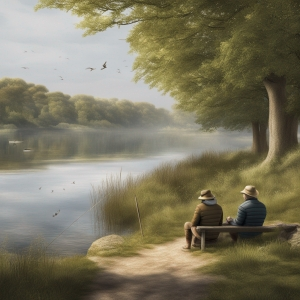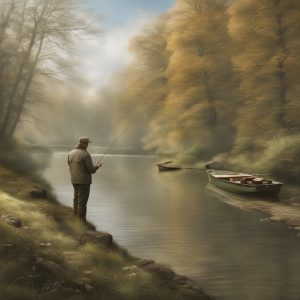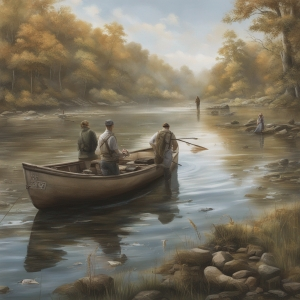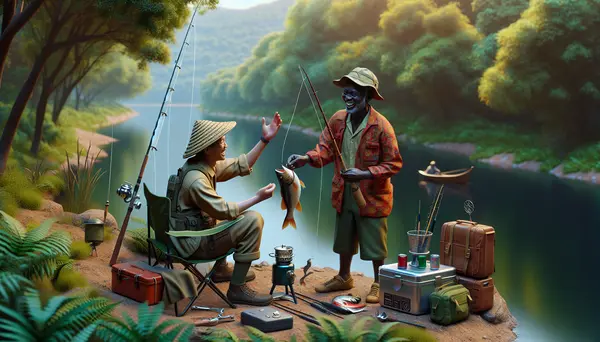Table of Contents:
Bankside etiquette is the code of conduct that we as fishermen and nature enthusiasts adhere to while pursuing our passion. It involves showing respect to nature, wildlife, and fellow anglers. In this article, we will introduce you to these basic principles and provide practical tips on how to observe them. This knowledge will enhance your fishing experience, make you a considerate angler, and help preserve our beautiful nature and aquatic life for future generations to enjoy.
Introduction to Bankside Etiquette
Understanding and respecting bankside etiquette is essential to creating a harmonious atmosphere at the fishing ground. The term "bankside etiquette" refers to the acceptable behaviours and considerations that need to be observed while indulging in the pleasures of angling. It's all about maintaining a courtesy-based relationship with fellow anglers, the surrounding nature, and aquatic life. This might sound intimidating if you're new to the fishing world, but don't worry; it's easier than you think!
Bankside etiquette comes down to basic manners and common sense. It means leaving the place as you found it or better yet, leaving it cleaner than you found it. It includes showing respect to other anglers, asking before casting near others, and promoting a tranquil environment. It's all about ensuring that everyone at the bankside can enjoy a peaceful, fulfilling fishing experience.
The concept doesn't just relate to the fishermen, but to every aspect of the environment. It's about respecting the fish that you catch, handling them with care, and releasing them back into the water safely if you’re practicing catch-and-release. It's also about respecting the wildlife around you and not disturbing their habitat.
If you're a beginner, acclimating to these customs might take some time. But as you gain more experience, they will become second nature. Remember, the motivation behind bankside etiquette is not just about rules; it's about fostering a love and appreciation for nature and fishing. Ultimately, it's the art of catching fish while preserving the environment and the joy of fishing for everyone around you.
Understanding the Importance of Respect in Fishing and Camping
Respect in fishing and camping revolves around three interconnected elements: the environment, fellow anglers and campers, and the wildlife. Each of these elements plays a crucial role in the overall outdoor experience and must be treated with utmost reverence.
The environment, our natural playground, provides us with spaces to unwind, rejuvenate, and enjoy our preferred activities. We must strive to leave no trace on our environment, to ensure its preservation for future generations. This essentially means cleaning up after ourselves and avoiding actions that may harm the environment, such as littering, carving trees, or damaging fauna.
Respect for fellow anglers and campers, on the other hand, promotes a harmonious atmosphere and shared enjoyment of public spaces. Courtesy in fishing entails seeking permission before setting up close to another's spot and keeping noise levels to a minimum. In camping, respect translates to giving fellow campers space and privacy, and observing quiet hours.
Lastly, wildlife is an integral part of the outdoors. Animals should be observed from a distance, without disruption to their natural behaviour or habitat. To do this, we must refrain from feeding wildlife, disturbing nesting grounds, or leaving food or trash that might attract animals.
In short, respect in the context of fishing and camping goes beyond the basic manners of please and thank you. It's a holistic approach to preserving and enjoying the great outdoors — a commitment to being a responsible citizen of nature.
Pros and Cons of Bankside Etiquette for Beginners
| Pros | Cons |
|---|---|
| 1. Contributes to preserving the natural landscape | 1. Requires good understanding of the etiquette |
| 2. Increases respect among fellow anglers | 2. May impact the freedom of fishing approach |
| 3. Enhances the quality of the fishing experience | 3. Potential conflicts if rules are not universally followed |
| 4. Promotes wildlife conservation | 4. Adds another layer of responsibility to the anglers |
The Unwritten Rules of Fishing

While the sport of fishing doesn't come with a handbook, there are a few unwritten rules that exist to maintain peace and fairness in the angling community. These guidelines go beyond law and regulation - they are customs passed down through generations of anglers, rooted in respect and consideration for others.
One such rule is observing personal space. Just as you would not like someone invading your space, you must ensure to keep a respectful distance from other anglers. It's considered polite to ask if it's okay to fish near someone, especially in crowded fishing spots.
Another rule concerns handling caught fish. Always handle your catches with wet hands to prevent removing the fish's protective slime. Furthermore, if you're not planning on keeping the fish, ensure a quick release back into the water.
Quietness is another key aspect. Noise can disturb fish and fellow anglers alike. So, keep volume at a minimum, whether it's talking, playing music or the sound of your equipment.
Finally, remember the golden rule of fishing: Leave no trace. Anything you bring with you to a fishing spot, including line, tackle, and litter, should be taken back. Let's keep our fishing spots clean and enjoyable for all.
How to Respectfully Share the Bankside and Waters
Becoming a member of the fishing community involves understanding that fishing spots are shared spaces. Therefore, treating fellow anglers and the natural environment with utmost respect is crucial. Here's how you can achieve that.
Firstly, observe good conversation practices. Interactions should be cordial, respectful, and should never disturb the peace of the waters. The fishing site is a place of tranquillity and enjoyment; let's keep it that way.
Secondly, leave ample space between yourself and other anglers. This takes into account that each angler has equal rights to the fishing area. If you plan on fishing near another angler, a polite question can go a long way in showing your respect.
Next, play your part in preserving the environment. Minimise damage to flora and fauna, clean up any litter you might find, and stick to designated walking paths wherever possible. When barbecuing or campfire cooking, always use the designated areas to avoid accidental wildfires.
Finally, every action you take should be aimed at minimising disturbance to wildlife, including aquatic life. Avoid splashing or making loud noises that might frighten the fish or local wildlife. Remember, we are visitors in their home; it's only fair we behave accordingly.
In conclusion, we all can respectfully share the bankside and waters if we realise that our actions affect others and the environment. By making these practices a habit, we can ensure everyone's fishing experience remains enjoyable and sustainable for the long term.
Keeping the Nature Intact

One fundamental aspect of bankside etiquette is to take utmost care in preserving nature. When we go fishing or camping, we are essentially guests in nature's house, and it's our duty to treat our host with respect. This involves taking a few simple, but significant steps.
Firstly, make sure to carry a trash bag with you. Picking up after yourself is a basic rule of outdoor activities. All your waste should be carried out with you, including fishing lines, bait packaging, cans or any other debris. A clean environment is not only visually appealing but also safer for the wildlife.
Secondly, be careful with campfires. Apart from the risk of wildfires, a poorly managed campfire can leave an ugly scar on the landscape and can potentially harm the surrounding flora and fauna. Always check local regulations before starting a fire, and when allowed, make sure it is fully extinguished before you leave.
Lastly, respecting wildlife is a must. We must remember that they were here first. Avoid damaging their habitats or causing them unnecessary stress. Do not feed them or try to attract them with food. This can disturb their natural diet and behaviors.
By following these principles, you’re not only respecting nature, but also helping to preserve it for future generations to appreciate and enjoy.
Importance of Noise Control
Noise control is a fundamental part of bankside etiquette. While we all enjoy the company of our friends or family when fishing or camping, it is essential to remember that excessive noise can disrupt the peaceful setting. Remember, the purpose of heading outdoors is to immerse ourselves in the tranquility of nature.
High levels of noise can not only disturb your fellow anglers but is also detrimental to wildlife. Many creatures are sensitive to sound, and a sudden, loud noise can scare them away. Noise pollution has been known to impact the behavior of birds, mammals, and especially fish. It affects their communication, reproduction, and predator/prey detection abilities.
Therefore, as a thoughtful and responsible angler, we must make efforts to keep noise levels to a bare minimum. This could involve muting your cell phone, speaking in low tones, and refraining from loud activities. Also, try using quieter gear when possible, as some fishing gear can create a significant amount of noise.
Maintaining a peaceful and quiet environment will not only show your respect towards the wildlife and other anglers but also improve your chances of making a good catch. In essence, noise control fosters a more satisfying and fruitful outdoor experience for everyone.
Littering is a No-Go

Littering is one of the most frowned-upon actions in the angling and camping communities. Leaving behind waste not only defaces the beauty of our natural surroundings but also poses a significant threat to both terrestrial and aquatic life. Numerous animals can get stuck in pieces of plastic, swallow dangerous refuse, or find their habitats polluted by thoughtless littering.
Practising responsible waste management is simple. Always carry a trash bag with you for your litter. Pick up after yourself and ensure that you take all your garbage with you when you leave. Keep in mind the adage: "Take nothing but pictures, leave nothing but footprints". This notion should guide your behaviour around any campsite or fishing area.
Moreover, if you see litter that’s been left behind by less considerate visitors, do the environment a massive favour and pick it up. This simple act will not only make the environment cleaner but will also make you feel good about your positive contribution.
Beyond being a decent and respectful angler, it’s also essential to educate others about the importance of not littering. If you’re out fishing with friends, family, or even acquaintances, remind them of these crucial principles. Leading by example is often the most effective way to spread awareness and invoke change.
Respecting Strict Fishing Times
Observance of established fishing times is a critical aspect of bankside etiquette. Many fishing spots may have set timings driven by various factors including local regulations, wildlife protection measures or simply due to tradition. Respecting these times not only demonstrates your comprehension of the rules; it underlines your respect towards fellow anglers, the local community, and the fishery.
Opting to fish during established times also has biological rationale. Fish are less active during hot hours of the day, making dawn and dusk the most productive fishing periods. Additionally, in some seasons or regions, certain times are allocated for breeding and spawning. Fishing during these protected windows can disrupt the lifecycle and population of the fish, besides being a legal offence.
If you're unsure about the fishing times, it's always a good idea to ask. Local bait shops or fellow anglers are usually more than willing to share this information with beginners. You can also find this information from local fishing websites and online forums. Remember, the fishing community is a friendly one, and everyone shares the common goal of preserving our sport and its values.
Conclusion : The Surrounding Shapes Your Experience
In closing, bankside etiquette is not just about rules, but more about fostering a healthy relationship with the environment, fellow anglers, and the wildlife. This relationship, in turn, sets the atmosphere for the entire fishing and camping experience. When we abide by the unwritten code of the outdoors, we ensure that our surrounding not only remains beautiful and serene, but also shapes our experiences positively.
This connection to nature, the quiet moments of introspection, the excitement of the catch, the respect shown to the power of wildlife - all are part of the angling adventure. True essence of the fishing spirit lies in the harmony between us, the environment, and its inhabitants. Exceptional anglers understand this, and they always leave a place better than they found it, thus guaranteeing the joys of fishing for future generations. To them, bankside etiquette is simply a reflection of their love and respect for the sport and nature.
As a beginner, cultivating this mindset not only makes you a better angler, but also someone who contributes positively to the world. So, the next time you head out fishing or camping, remember to carry with you respect and thoughtfulness. With these, you can help preserve and enjoy our shared outdoor heritage for a lifetime.
Frequently Asked Questions about Respectful Fishing
Why is respect for nature important while fishing?
Respect for nature ensures the sustainability of fishing habitats and aquatic species' life cycles, promoting a healthy ecosystem and allowing future generations to enjoy fishing.
What should I do with my litter when fishing?
Always take your litter with you. Leaving litter can harm wildlife, and it's disrespectful to nature and other anglers.
How can I respect other anglers while fishing?
Respect other anglers by maintaining a suitable distance from their fishing spots, keeping noise to a minimum, and not interfering with their fishing lines.
Is it necessary to follow catch and release principles?
Yes, catch and release helps to preserve fish populations and it's a great way to enjoy fishing without depleting natural resources.
What kind of bait should be used to ensure that fish are not harmed unnecessarily?
Using artificial lures or barbless hooks can minimize harm to fish, making it easier for them to recover after being released.







